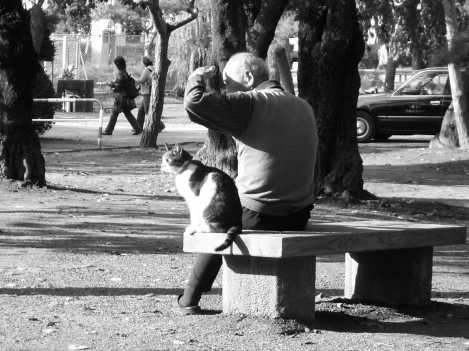« March 2006 | Main | May 2006 »
April 12, 2006
On the margin of those unhappy French
It has become a commonplace to castigate in much morally charged a manner those participants in the global marketplace who allegedly, with the unhappy French, belatedly seek security in the form of state regulations instead of braving the unlimited future possibilities, and shrinking from risk forsake the promise of independent freedom of the fluid environment of unrestricted labour-market. Such at least seems to be the tone of a lot of comments on this.
But there is something inconsistent and possibly hypocritical about this self-assured tone of the critics. Because as long as our whole civilised existence, yes, the very economic progress for the benefit of which all that deregulation is supposed to be happening, is based on the concept of easing mankind from all drudgery and every inconvenience, of providing the ultimate security of cheap energy and cheap goods available to almost everyone, of assuring leisure as an alternative, not complement, to labour, so long it will be only natural for individual members of the society to request and expect for such security to be delivered and guaranteed by all available public resources.
In a non-trivial way, in this respect, as for the basic structure of the underlying psychology, current French protests have perhaps more in common than would appear at first sight with the U.S. administration's assertion of the right to protect American interests and American way of life by intervening in various areas all over the world in the name of assuring, obviously, not adventurous flexibility and unregulated fluid openness, but nothing else than security, predictability, and well regulated order. And it appears to make perfect sense to read, say, the Patriot Act as a result of choice between freedom with risk and restriction with security. Whether such trade-off between freedom and security concerns labour markets and international trade regulations or whether it concerns internal policing and international relations, there is still the same fundamental psychology at work.

It is difficult to decide whether in the end humans really thirst more for freedom than for safety, and for prosperity more than for security. And more often than not, our representatives from all sides of the political spectrum seeking our votes, persuade us that we are as a matter of course entitled to full security, that our ways of life and our levels of energy consumption and waste production are our inalienable right which our economies, organisations, institutions, and armies are here to deliver and protect. Why is it then cowardly, reactionary and shortsightedly improvident to seek security and protection from unregulated markets, when it is not commonly classified as cowardly, reactionary and improvident to seek by all available means the security of our energy supplies and protection of our national interests?
Posted by david at 05:58 AM | Comments (0)
Men and Women of Letters: Samuel Richardson's Epistolary Sensibility
Samuel Richardson. Pamela, or Virtue Rewarded
⎯⎯. Clarissa Harlowe, or The History of a Young Lady
"My talent is scribbling; and I the readier fell into this freedom, as I found delight in writing..."
Miss Clarissa Harlowe to Miss Howe
Thursday Afternoon, April 13 [Vol.2, Letter IX]
When Samuel Richardson (1689—1761), an honourable printer of London (official publisher for the House of Commons, among others), published his first novel-in-letters and became famous for it, he not only established a literary genre, but became probably the first Englishman to gain renown abroad purely for his literary achievement. His Pamela was almost immediately translated into all major continental languages and was to all effects a genuine early world best-seller. For some reason, however, today's reader does not find Pamela or Clarissa quite as exciting and these early samples of fiction in prose have gradually gathered dust as objects of pedantic interest of literary historians. This may partly be so, because their role as thrilling entertainment for wide commoner readerships has in the meanwhile been taken over by other genres and different media. (And is it really so inconceivably more difficult to persist over hundreds of pages of an epistolary novel than it is to endure dozens of instalments of a TV soap-opera?) Part of such change in taste, however, might perhaps be attributed to a difference in perception of the relative importance of the letter and the act of letter-writing itself between our age and Richardson's.
When Richardson chose the epistolary form for his first novel — which in terms of plot is basically a variation on the Cinderella-theme — he was not opting for a formal experiment. On the contrary, he quite naturally reached out for a form of narrative which was the most familiar to himself and majority of his readers. Richardson himself had already earlier in his life compiled a sort of manual of letter-writing — this noble art of cultivated interaction providing channels of expression to the commercial urban society. Yet, the letters written by his heroes are certainly more than a collection of recycled clichés. The epistolary narrative contains plenty of direct speech alongside faithful rendition of thought and feeling, and many scenes have a dramatic thrill unhampered by the form, like some pitched exchanges between Clarissa and her suitor, and finally raper, the libertarian Lovelace, or the tense debate on the verge of a duel between the latter and Clarissa's cousin, colonel Morden.
Letter becomes not only a form of the narrative, but also its crucial subject matter and often a focal point of the plot. The act of letter-writing itself is depicted; letters serve as solemn evidence of one's true and unrehearsed intentions; letters are intercepted and different letters forged to deceive the addressee; letters are written about other letters; parcels of correspondence are exchanged as powerful evidence of events and states of mind; copies of letters are meticulously taken for future reference; and letter-writing becomes suspect as an activity potentially politically charged in the sense of threatening the borderlines of class. In the centuries to follow, the type of literary fiction which renounces the omniscient disembodied narrator and turns to multiple voices of situated storytellers emerged out of concern about ambiguity of truths and parallel versions of reality. More modernists followed Joyce and Virginia Woolf into the minds of storytellers who were at the same time participants in the story. So does Faulkner or Lawrence Durrell. Even a Tanizaki, in Kagi, shakes the reader's comfortable faith in an unproblematic unity of narration and reality, when he lets him see the stage of events only through diary notes of the characters, which might but well might not give an honest and undistorted report of facts.
Richardson's aim in employing the multiple narrative voices was not to render truths ambiguous. His world appears still to hold together by the categorical visions of chaste and pious virtue opposed to licentious vice, although the unshakeable validity of the same visions has already begun to crumble under the sceptical eye of his contemporary Daniel Defoe, say in the cynical view from below of a Moll Flanders, which seems to offer a rather unflattering picture of strong social and class conditioning latent behind many moral categories.
But we are in an England of rising sensibilities, in an England of emerging commercial empire, an England whose Scots have just asserted that morality does not equal subjecting crude passions to noble reason, nay, that it has a lot to do with cultivating of emotions in civilized social intercourse. And Richardson's novels, not even the happy-ending Pamela with the heroine's virtue ultimately rewarded by marriage with Squire B., to say nothing of the much more complex and longer Clarissa with her virtue asserted to the point of self-sacrifice full of forgiveness, amount to more than simple illustrations of catechism. Conventional chaste virtue is exalted, but so is the pure feeling of uncorrupted heart, and still alongside those it is accomplished manners and mastery of complex patterns of accepted behaviour what provides the standard for practical evaluation of individuals.
To the extent that they offer thrills of excitement to the readers, enticing their imagination to recreate the realities implied by the words, Richardson's novels are unmistakable children of the age of sensibility, regardless of their ostensible moralist bend. The same is manifest in a slightly earlier sample of roughly contemporary prose written for wide audience: in the first decade of Richardson's, Defoe's, Hume's and Rousseau's century, Addison and Steele publish their famous periodical The Spectator, which at times enjoys a circulation of an impressive 3000 copies. Frequently, the contributions take the form of letters, authored by Mr. Spectator himself, in response to enquiries written by readers. Ostensibly committed to moral cultivation of the general public, the Spectator does not unswervingly stick to the course of moral upbraiding. Describing, in one issue of 1711, Plato's commendably persuasive and morally elevating notion of hell, the author proceeds to illustrate his point by a story brimming with mischievously provoking eroticism of Boccaccian proportions. In Plato's underworld, Spectator explains, the voluptuous and lustful souls have to go on suffering their burning desires for which there is no gratification, like king Tantalus they must forever reach out for fruits which escape their grasp, and thirst for water which dries up the moment they bend to drink. Desires can sentence us to the same kind of suffering in this world, too, the author goes on to argue. Promptly presented is a fictitious letter by a French gentleman who, having courted two ladies simultaneously, was taken terrible vengeance upon by them when they swaddled him up so he could not move and made him spend a night with both of them in the same bed, the truly tantalizing effects of such torture described in excitingly vivid detail clearly exceeding all requirements of the moral purpose of the story, indeed, presumably undermining such purpose altogether.
The ironic contradiction presumably provides an answer to itself. The sensibilities of the first commercial century inevitably consider themselves superior in cultivation and civilization to the stark medieval images of austere chastity and hell's horrors. The mind of this early modernity needs to embrace both the Boccaccian erotic innuendo and thrill of imagined debauchery on the one hand, and the social codes of conformity, restraint and pious virtue on the other. Social appreciation of wit and sophistication requires one to be master over both sides of experience; and to restrict oneself merely to the aloof ascetic virtue carries a distinct tint of obsoleteness. A concept of manners, which makes its unobtrusive appearance in moral and political thought of Hume and other Scots, might represent a tool for such impossible synthesis. It is precisely the civilized cultivation of sensibility, accompanied by a relatively conservative commitment to existing social norms as embodying cumulated experience what characterizes not only the Scottish Enlightenment, but also the literary achievements of Samuel Richardson. Read as a portrayer of manners, incidentally, he is much more readable than as a puritan moralist obsessed with dread of sex.
Posted by david at 12:39 AM | Comments (0)
April 03, 2006
…

「こんにちは」とその初老の男が声をかけた。
猫は少しだけ顔をあげ、低い声でいかにも大儀そうに挨拶をかえした。

「なかなか良いお天気ですね」
「ああ」と猫は言った。

「雲ひとつありません」
「……今のところはね」
「お天気は続きませんか?」
「夕方あたりからくずれそうだ。そういう気配がするな」と猫はもぞもぞと片足をのばしながら言った。それから目を細め、あらためて男の顔を眺めた。

男はにこにこと微笑みながら猫を見ていた。
猫はどうしたものかと少しのあいだ迷っていた。それからあきらめたように言った、「ふん、あなたは……しゃべれるんだ」

「はい」と老人は恥ずかしそうに言った。
(村上春樹「海辺のカフカ」より)
Posted by david at 07:24 PM | Comments (0)